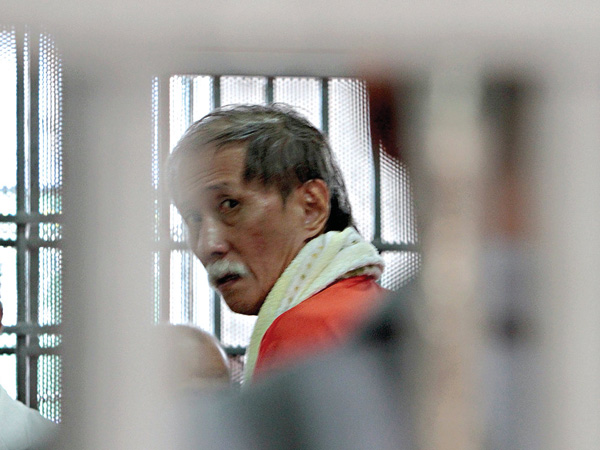The Court of Appeals has denied the petition of the Bureau of Corrections, which sought the reversal of a Muntinlupa City court ruling that granted in 2014 the writ of habeas corpus petition filed by convicted road rage murderer Rolito Go and his wife Elsa.
In its 12-page decision released Friday, the appellate court’s Eleventh Division said it lacked jurisdiction to rule on the BuCor’s petition that stemmed from Go’s questioning of the computation of his prison term, which he said should have ended in August 2013.
“Given that the issues to be resolved in this appeal only involve questions of law, the proper recourse should have been to file with the Supreme Court a petition for review on certiorari under Rule 45 of the Rules of Court. Accordingly, this appeal is an improper remedy and we have no recourse but to dismiss the same,” the appeals tribunal said in the decision written by Justice Pedro Corales.
The other division members, Justices Sesinado Villon and Rodil Zalameda, concurred in the ruling.
The Court of Appeals pointed out that in the BuCor’s appeal, made through then Director Franklin Bucayu, the agency was only assailing the correctness of the Muntinlupa Regional Trial Court’s intepretation of Section 7, Chapter 3 of the BuCor’ Operating Manual, the conclusions drawn from it, and their application to the established facts surrounding Go’s case.
Thus, the CA explained, there was no more need to evaluate the evidence on record to determine the power of the BuCor to commute an inmate’s sentence.
“Applying the foregoing principles. We agree with spouses Go that the issues involved in this appeal pertain to questions of law, which we do not have the jurisdiction to decide,” the justices asid.
In January 2014, Go and his wife filed a petition for the issuance of a writ of habeas corpus in Go’s favor, naming Bucayu and other BuCor officials as respondents. The petitioners asserted that Go had already completed his maximum prison term on Aug. 21, 2013, after crediting the privileges of his penal colonist status, time spent in preventive imprisonment, regular good conduct time allowance (GCTA) and special credit time allowance.
As an inmate with colonist status, Go said he was entitled to privileges of automatic reduction of his life sentence to 30 years and additional GCTA of five days per month as long as such status was retained, which were accorded to other inmates previously released from New Bilibid Prisons.
Go, however, said he continued to be in prison due to Bucayu’s alleged inaction and refusal to recognize his (Go’s) privileges under the BuCor Operating Manual.
BuCor insisted that Rolito’s sentence would expire only on Jan. 31, 2022, as his reclassification as colonist did not commute his sentence to 30 years, adding that President Aquino did not exercise his exclusive prerogative to commute Go’s sentences.
The bureau said that Republic Act No. 2489 or An Act Authorizing Special Compensation, Credits, and Modification in the Sentence of Prisoners as a Reward for Exceptional Conduct and Workmanship and for Other Purposes, the basis of the BuCor Operating Manual, allowed automatic modification of a colonist ‘s sentence to 30 years only if he was serving sentence of life imprisonment.
Since, the penalty imposed on Rolito was reclusion perpetua, the BuCor pointed out that the privileges granted under RA 2489 were inapplicable in his case.
On Apr. 28, 2014, the RTC granted Go’s petition for habeas corpus, agreeing with his contention that his sentence indeed expired on Aug. 21, 2013.
The RTC pointed out that the BuCor manual has clearly granted to a colonist the automatic commutation of his life to 30 years. The RTC added that the privileges under the BuCor Operating Manual had been applied to other inmates as well.
To deny Go such privileges was illegal and such an act violated his constitutional right to equal protection of the law and due process, the RTC ruled.
Go, a construction magnate, was convicted of killing college student Eldon Maguan during a traffic altercation in 1991 in San Juan City. He was found guilty of murder by the Pasig City regional trial court two years later and sentenced to reclusion perpetua or up to 40 years in jail.
Go caused a stir when he escaped a few days before his conviction. He was rearrested in 1995. The Supreme Court upheld his sentence in 2000.
While incarcerated at the New Bilibid, Go had been repeatedly accused of receiving VIP treatment, such as being allowed to built his own cottage outside the prison facility. In 2012, he went missing and later claimed to have been kidnapped for ransom.
The prisoner, whose pleas for parole have been repeatedly denied, is suffering from colon cancer.
